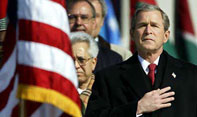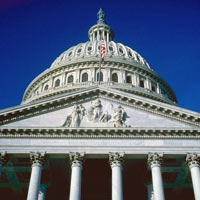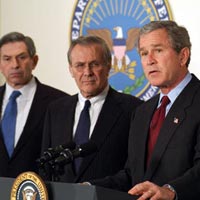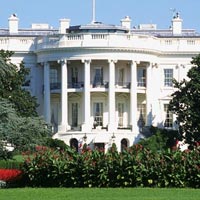- About Us
- Columns
- Letters
- Cartoons
- The Udder Limits
- Archives
- Ezy Reading Archive
- 2024 Cud Archives
- 2023 Cud Archives
- 2022 Cud Archives
- 2021 Cud Archives
- 2020 Cud Archives
- 2015-2019
- 2010-2014
- 2004-2009
 |
The New Bush Agenda' Four More Years: |
Regardless of one's political persuasion, in the aftermath of the recent U.S Presidential Election, the reality is that America and the world are now faced with four more years of a George Bush-led Republican administration.
But amid the endless sludge-pile of political rhetoric, spin and sound bites, what is a straightforward, non-partisan assessment of some of the key issues we can expect to dominate the Presidency in the four years ahead?
 Iraq and the 'War on Terrorism': By winning the popular vote 51-48% and with a 3.5 million vote margin, Bush feels he has been given a mandate of approval upon the path he led America during his first term in office. Or, as he put it, he now has 'political capital'. For this, just as the war on terrorism dominated the Bush agenda since 9-11, so too will it continue to be at the forefront of policy so long as U.S troops remain on the ground in Iraq and Afghanistan. Additional recent rumblings from Iran and North Korea regarding development of their respective nuclear programs have been a distraction, but, in many ways, a politically advantageous distraction from the hunt for an elusive Osama Bin Laden, something the Democrats failed to effectively capitalise upon during the campaign. Given the increased Republican strength in the House and Senate, Bush now has the power to make significant policy changes during his second term, and any opposition to financing and implementation of both the war abroad and certain aspects of 'homeland security' (such as the Patriot Act) will be hard fought.
Iraq and the 'War on Terrorism': By winning the popular vote 51-48% and with a 3.5 million vote margin, Bush feels he has been given a mandate of approval upon the path he led America during his first term in office. Or, as he put it, he now has 'political capital'. For this, just as the war on terrorism dominated the Bush agenda since 9-11, so too will it continue to be at the forefront of policy so long as U.S troops remain on the ground in Iraq and Afghanistan. Additional recent rumblings from Iran and North Korea regarding development of their respective nuclear programs have been a distraction, but, in many ways, a politically advantageous distraction from the hunt for an elusive Osama Bin Laden, something the Democrats failed to effectively capitalise upon during the campaign. Given the increased Republican strength in the House and Senate, Bush now has the power to make significant policy changes during his second term, and any opposition to financing and implementation of both the war abroad and certain aspects of 'homeland security' (such as the Patriot Act) will be hard fought.
Improving Relations With Europe: Undoubtedly one of the great successes of Karl Rove's Republican campaign was the way in which he was able to depict John Kerry's calls for greater cooperation with the world as a soft-footed policy that short'changed the greater American good for irrelevant interests abroad. Regardless, after 9'11 George Bush had at his disposal what was perhaps the greatest showing of pro'American goodwill since World War Two, and, right or wrong, he lost much of that global goodwill within a very short space of time. Irrespective of Bush's personal contempt for the U.N, he must (and mindful of his legacy, likely will) devote much of the next four years to repairing relations with an increasingly irate Europe, especially as more of his 'coalition of the willing' continue to opt out of their Middle Eastern commitments. The support of Europe is critical for Bush to win his war on terror. If he can somehow convince France and Germany to share some of the burden of his administration's leap into Iraq, then that would be a political coup.
 Pivotal to what little leverage Bush has in Europe will be the outcome of the U.K elections in a few months time. Tony Blair may have been encouraged by the successes of John Howard and George Bush, but he will face an even harder challenge at the ballot box. In Russia, however, Bush finds himself united with an ally through their shared fear of terrorism. While the two nations may disagree over such issues as democratic reform and, potentially, Vladimir Putin's recent announcement that he is pursuing the development of advanced nuclear weapons technology, terrorism plays a larger role in keeping them together. Still, Bush may find he is pleasantly surprised. Europe, now aware more than ever of the significant divide between them and a conservative America, could press to make the first steps in bridging the gap. There is much at stake. One half of America's total foreign investment is in Western Europe, and the European Union is not yet a significant enough counter to U.S power as the likes of Jacques Chirac would wish it to be.
Pivotal to what little leverage Bush has in Europe will be the outcome of the U.K elections in a few months time. Tony Blair may have been encouraged by the successes of John Howard and George Bush, but he will face an even harder challenge at the ballot box. In Russia, however, Bush finds himself united with an ally through their shared fear of terrorism. While the two nations may disagree over such issues as democratic reform and, potentially, Vladimir Putin's recent announcement that he is pursuing the development of advanced nuclear weapons technology, terrorism plays a larger role in keeping them together. Still, Bush may find he is pleasantly surprised. Europe, now aware more than ever of the significant divide between them and a conservative America, could press to make the first steps in bridging the gap. There is much at stake. One half of America's total foreign investment is in Western Europe, and the European Union is not yet a significant enough counter to U.S power as the likes of Jacques Chirac would wish it to be.
Uniting the nation and securing a legacy: For all the talk Bush made in the aftermath of his election about 'reaching across partisan lines' and earning the trust of a 'country divided', he faces an improbable, perhaps impossible task ahead. 55 million voters in the United States wanted someone else to lead them for the next four years and Bush would dearly love to win them over, however he will also certainly use those aforementioned gains in the House and Senate to his advantage. It is likely that he may choose to sacrifice a broader, popular legacy for political gains that will suffice for at least his own supporters to herald as admirable and historic.
On the strength of the 11 states that approved bans on same'sex marriage on Election Day, Bush will no doubt push for a constitutional amendment to ban gay marriage, an issue that of course bitterly distances him from so many 'blue state' voters in America. Just as potentially controversial will be his selection of new justices to the Supreme Court, and after having been rallied to victory by so many evangelical Christian voters, there are liberal Democrats who have promised to defend Roe v Wade to the bitter end. A woman's right to choose will certainly be a visible issue during this second term. Given the renewed role of religion and moralism in U.S politics, others are concerned with the larger view that the very role of the secular state in America is under threat. Indeed, few could disagree with the fact that in recent times the Bush administration and his 'red' heartland have seemed to speak a different language not just to the rest of America, but Europe and much of the world at large.
 But what may perhaps cause the most vicious wrangling over the next four years will be Bush's intended revamping of the social security system and proposed simplification of the tax code. Already Democrats have been stirring with their opposition to privatisation of social security and concerns of new, greater burdens upon the American middle class under Bush's new tax scheme, and neither plan has yet to be truly clarified satisfactorily. Further, under the already heaving strains of the war and first-term tax cuts, many commentators are wondering how Bush's ambitious and sweeping reforms will even be covered by the budget. Should he take too risky a route, the ill effects of his manoeuvring will be borne by Americans well after Bush has left office, and a more painful than pleasant legacy will surely taint the presidency of George W. Bush Jr.
But what may perhaps cause the most vicious wrangling over the next four years will be Bush's intended revamping of the social security system and proposed simplification of the tax code. Already Democrats have been stirring with their opposition to privatisation of social security and concerns of new, greater burdens upon the American middle class under Bush's new tax scheme, and neither plan has yet to be truly clarified satisfactorily. Further, under the already heaving strains of the war and first-term tax cuts, many commentators are wondering how Bush's ambitious and sweeping reforms will even be covered by the budget. Should he take too risky a route, the ill effects of his manoeuvring will be borne by Americans well after Bush has left office, and a more painful than pleasant legacy will surely taint the presidency of George W. Bush Jr.
images courtesy of Geek Philosopher
